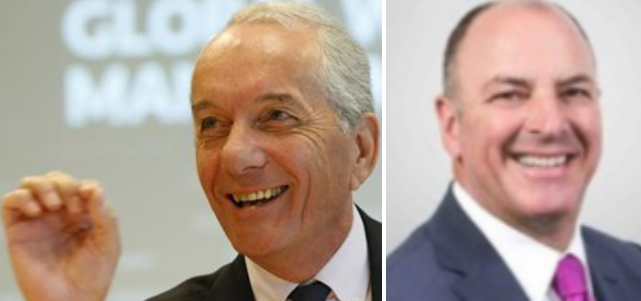

By John Helmer, Moscow
@bears_with
Two Swiss bankers for fugitive Russian bank robber Sergei Pugachev have been convicted for the second time in Switzerland of violations of Switzerland’s money-laundering law and regulations.
Pugachev is a major source reported by Catherine Belton for the April 2020 book, Putin’s People. She and the Reuters special “enterprise unit” in New York which employs her, have not reported the evidence or the convictions in the Swiss case.
The Swiss court has attempted to keep the identities of the two bankers and their bank secret. The 38-page text of the judgement against them was dated by the court on May 31, 2021, but not issued until July 27. It was not published until October 1. It has not been discovered by the press until now.
The two men convicted are Guillaume Lejoindre, a former chief executive and board director of Société Générale’s (SocGen) private bank in Geneva, and Mario Kleinfercher, the bank’s chief compliance office at the time SocGen was taking Pugachev’s money. According to the court evidence, between December 2008 and April 2009, he transferred a total of $713 million between 30 accounts of Russian and Cypriot companies Pugachev controlled through two sons; the transfers were part of fake loan schemes. Because the sums were in US dollars, a US bank was also involved.

Left: Guillaume Lejoindre in a 2009 photograph published by Reuters, which reported him as saying about his clients’ reasons for banking in Switzerland: “The rule is you don’t ask people.” Right: Mario Kleinfercher.
Between 2011 and 2013, the Russian Central Bank and prosecutors commenced legal action against Pugachev and his Russian bank, Mezhprombank, for stealing about $1 billion in loans to the bank, and concealing the money offshore through Switzerland, Cyprus, New Zealand, and other havens. British High Court litigation over the stolen money has resulted in judgements against Pugachev, including a prison sentence after he fled to France. Pugachev has failed in his counter-claims and allegations against Russia in The Netherlands, Spain, and other international jurisdictions.
Lejoindre is called A in the Swiss judgement; Kleinfercher, B. SocGen is called Bank C. Pugachev, their client, is called D, “a Russian businessman”.
The court reveals about LeJoindre, 70, that he is married but childless; earns a 6-figure salary; has accumulated a multi-million franc fortune, and receives both salary and pension. Kleinfercher, 61, is married with three children. Both of them are reported by the court to be paying mortgages and living “comfortably”. They are identifiable from the evidence, and by the names of the two Geneva lawyers who have confirmed representing them, Olivier Brunisholz for Lejoindre; Daniel Tunik for Kleinfercher. Brunisholz has refused to respond to press questions. Tunik told the Swiss press the case had been “politically motivated”.
Read the judgement in full (French) here.
The archive of the case from last year can be read here and here.

The Swiss prosecution’s dossier, reportedly more than 200 pages long, has not leaked in the Swiss press. The details of the case might not have become public knowledge if Lejoindre and Kleinfercher had not contested their convictions by the Federal Financial Market Supervisory Authority (FINMA), and challenged their fines – CHF 30,000 ($32,700) for Lejoindre, CHF 60,000 ($65,400) for Kleinfercher.
These were modest penalties: Swiss law provides a fine of up to CHF500,000 when bank managers intend to violate the law on controlling suspected money-laundering transactions by their clients; for the lesser offence of negligence, the maximum fine is CHF150,000. The court says that in setting the fine it can also judge “the financial situation of the perpetrator.”
LeJoindre and Kleinfercher appealed to the Federal Criminal Court at Bellinzona. A one-day hearing took place last April. The evidence against Pugachev was accepted, not tested.
In the judgement against Pugachev’s bankers, the court has ruled that LeJoindre had “acted negligently. Objectively, A.’s behaviour resulted in a failure to communicate the banking relationships opened in the names of D. and his sons over a relatively long period of two and a half years…Despite his professional training and many years of experience in the banking field the defendant acted carelessly [avec superficialité]…The offence could have been avoided if he had paid the necessary attention to the examination of the documentation at his disposal…and if he had complied with his supervisory duty… Since the offence was committed negligently, the motive and intensity of the criminal will should not be considered. His guilt should be called average…In general, he cooperated in the investigation. Taken as a whole, the elements relating to the author are favourable and justify a slight to medium reduction of the sentence.”
The court ruled to cut the fine in half, to CHF15,000. “A reduction of the sentence is justified, due to the time that has elapsed since the moment when the offence ended, that is, in October 2013, and the date of this judgment, which comes – after the termination of the statute of limitations of the criminal action – more than seven and a half years after the facts. There is no indication that A. behaved badly during this period.”
Kleinfercher’s guilt was more serious, the court decided. “With a professional background in the fields of compliance and the fight against money laundering and many years of experience in the banking sector and, in particular, in that of compliance… B. made a wrong decision, to which he stuck, even after the intervention of the MP-GE [Geneva’s justice and police ministry], in 2013… he seems to have been more concerned about the bank’s reputation than its anti-money laundering obligations. The intensity of the tortious intent he has shown, however, remains low, notwithstanding the duration of the omission. His guilt thus appears low.”
Because of the eight years between the offence and the court judgement, and because he hadn’t “behaved badly” in the interval, Kleinfercher’s fine was cut to one-third, CHF20,000.
Lejoindre left SocGen in 2016, and is currently listed, alongside his lawyer, with the Family Office Network Service (FONS), a private client advisory company. Kleinfercher is currently head of group compliance at the Union Bancaire Privée (UBP). Their lawyers have been contacted about the case, but they do not respond.











Leave a Reply